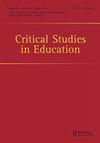怪异的教学法:在殖民暴力现场教授艰难的历史
IF 2.7
2区 教育学
Q1 EDUCATION & EDUCATIONAL RESEARCH
引用次数: 5
摘要
摘要2022年,新西兰历史将从选修科目转变为各级学校的必修科目。教授新西兰艰难的历史有可能重建定居者与土著的关系,以展示历史上的殖民不公正如何影响今天的人们,但它提出了一个问题,即谁的历史将被验证和教授,以及定居者对打破围绕殖民暴力的沉默的不适如何通过教育来解决。在萦绕不去的学术基础上,我们引入了定居者殖民地穴的概念,以展示定居者对殖民暴力的记忆和遗忘如何受到毛利部落记忆的挑战和改变。在殖民暴力发生地引入艰难历史的同时,还伴随着不可思议的事情;令人不舒服和恐惧,但又刺激和鼓舞人心的智力、情感和具体体验,产生了考虑定居者与土著关系的新方式。一项大型人种学研究的数据揭示了新西兰不同群体是如何记忆或忘记新西兰战争的,这些数据揭示了中学生在实地考察中是如何被引导走向神秘的。这次访问表明,有可能改变对入侵和暴力如何伴随解决的理解,为采取行动提供动力,并为真正的和解努力奠定基础。本文章由计算机程序翻译,如有差异,请以英文原文为准。
Uncanny pedagogies: teaching difficult histories at sites of colonial violence
ABSTRACT In 2022, New Zealand history will shift from an optional to a compulsory subject across all levels of schooling. Teaching about New Zealand’s difficult histories has the potential to reconstitute settler-Indigenous relations to show how historical colonial injustice impacts people today, but it raises questions about whose history will be validated and taught and how settler discomfort about breaking the silences surrounding colonial violence might be addressed pedagogically. Building on scholarship in haunting, we introduce the notion of a settler colonial crypt to show how settler memory and forgetting of colonial violence can be challenged and transformed by Māori tribal memories. The introduction of difficult histories at sites of colonial violence is accompanied by the uncanny; intellectual, emotional and embodied experiences that are uncomfortable and frightening, yet stimulating and inspiring, to generate new ways of considering settler-Indigenous relations. Data from a large-scale ethnographic study exploring how different groups in New Zealand remember or forget the New Zealand Wars reveal how secondary school students were directed towards the uncanny during a field trip. The excursion demonstrates the potential for transforming understandings about how invasion and violence accompanied settlement, providing the impetus for something-to-be-done and setting the groundwork for genuine attempts at reconciliation.
求助全文
通过发布文献求助,成功后即可免费获取论文全文。
去求助
来源期刊

Critical Studies in Education
EDUCATION & EDUCATIONAL RESEARCH-
CiteScore
10.10
自引率
5.10%
发文量
18
期刊介绍:
Critical Studies in Education is one of the few international journals devoted to a critical sociology of education, although it welcomes submissions with a critical stance that draw on other disciplines (e.g. philosophy, social geography, history) in order to understand ''the social''. Two interests frame the journal’s critical approach to research: (1) who benefits (and who does not) from current and historical social arrangements in education and, (2) from the standpoint of the least advantaged, what can be done about inequitable arrangements. Informed by this approach, articles published in the journal draw on post-structural, feminist, postcolonial and other critical orientations to critique education systems and to identify alternatives for education policy, practice and research.
 求助内容:
求助内容: 应助结果提醒方式:
应助结果提醒方式:


